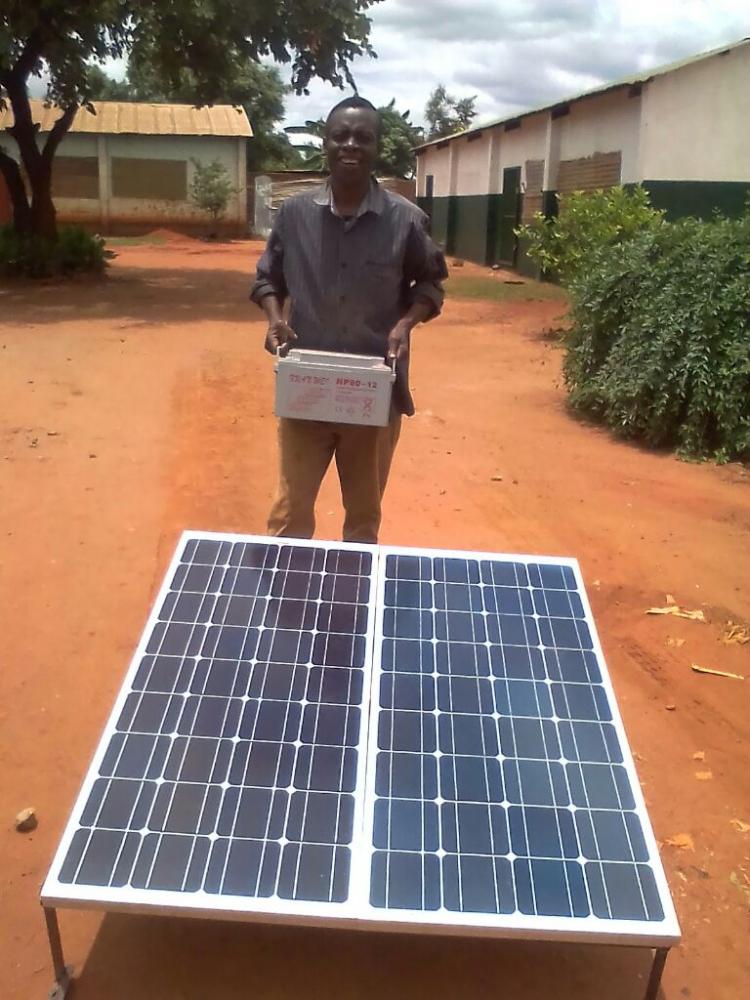
Renewable energy is becoming another source for energy hope for Malawi where industries, individuals are working more to reduce energy poverty challenges Malawi is facing. Kenneth Mtago of Renew’N’able engaged Solarentrepreneur Chisambazi Nyirenda to highlight on Solar and Solar Trade Association.
Q1. Can you introduce yourself, who you are, what do you do and of course your position
My name is Chisambazi cha kwa Jeremiah Mwanalilenji Nyirenda II. I hold a MBA in Financial Management from Exeter University, UK, a BSc. (Hons) in Financial Services from University of Manchester Institute of Science and Technology (UMIST) and I am a qualified banker, Associate of the Chartered Institute of Bankers (ACIB), UK with over 20 years in banking and finance. I also hold a Certificate in Solar Systems Design and Installation from Mzuzu University and can point to 3 years’ experience in the solar industry. I am passionate about Renewable Energy and consider myself as a socially and environmentally conscious solar-preneur with a deep appreciation of the potential positive impact of renewable energy technologies in providing impactful solutions for sustainable development in Malawi specifically as well as globally. I am a MERA-certified solar systems designer and installer and also Executive Director of Solar Trade Association (STA), a representative industry body for solar technology practitioners in the country.
Q2. Can you explain to us what the Solar Trade Association is?
Solar Trade Association (STA) is a dynamic membership-based institution which represent the interests of solar industry players, to lobby and advocate for appropriate legislation, policies and strategies conducive for the growth of solar industry businesses, projects and initiatives in Malawi with a mission to transform the solar industry in Malawi by working hand-in-hand with Renewable Energy Industries Association of Malawi (REIAMA) as an umbrella organisation, with a focus to specifically promote the interests of the significant solar industry.
Q3. You are doing much as an Association, what factors can you advise the consumer to consider when sourcing a solar home system?
Well, my advice to consumers is to ensure that they deal with MERA-certified businesses/ individuals because these are under strict obligation to adhere to best practice and ethical standards and face censure should they not follow recommended standards or procedures. Ideally, such practitioners should also be members of a recognized industry association such as Solar Trade Association as our members are also required to adhere to high standards of practice.
So, to answer your question, sizing a solar system is a highly technical area that requires an expert with the requisite knowledge in solar design and installation. However, suffice to say that the ultimate objective is to ensure that the system is efficient and effective and meets the needs of the client in terms of daily energy requirements with an adequate standby/ autonomy period in case of inadequate solar radiation. This requires use of a well-balanced combination of solar panels, charge controller, batteries and, in an AC system, inverter. I must stress that the use of quality components is key and the client must insist on some acceptable guarantee of works as well as a service / maintenance contract to ensure that the system performs to expected levels at all times.
Q4. Solar technologies are often deemed “too expensive”, surely the positives outweigh the negative. Perhaps the general population needs to know of its benefits. Maybe you can shed some light on this.
Every time I hear the word “expensive” I always think of the expression “If you think education is expensive, try ignorance!” In the present Malawi context of persistent blackouts, one can easily rephrase this to “If you think that solar is expensive, try Engenco/ Escom!”
Humour-aside, the point is that it’s more costly not to have power and it makes sense to invest in a sustainable source of power like solar. Now, it’s important to understand that solar power can be generated on a large scale via solar farms, or via mini or micro grids or even on an individual level via home, farm or business installations or use of SHS or PICO products.
Overall, yes, the upfront cost of solar is high but in the long-run it is actually cheaper. Having said the above and going back to the analogy of knowledge and ignorance, it’s my view that it’s better to have solar power than no power or dirty power by way of fossil-fuel based alternatives like generators and paraffin. All these, including candles and batteries, are actually more expensive than solar on a cumulative-use and convenience level. Solar power is clean, sustainable and environmentally-friendly, providing a continuous source of power for household and business use therefore ensuring continued or increased productivity throughout the day and night in business, educational, social and entertainment pursuits.
Q5. How does one take care of the system and what sort of maintenance is required?
Maintenance of a solar system should involve regular full inspection by the installer to ensure that it is performing according to its design parameters. This can be done quarterly or bi-annually depending on the system size. However, the client must also be schooled in basic maintenance issues such as cleaning of the solar panels to prevent accumulation of dust and particles as well as monitoring system performance using indicators on the charge controller or inverter and, in some cases, checking on battery lead acid levels.
Q6.What can you tell Malawians on renewable energy with much focus on solar?
Renewable energy is the way to go and Solar is the Future. So, Let’s Go Solar Malawi!
